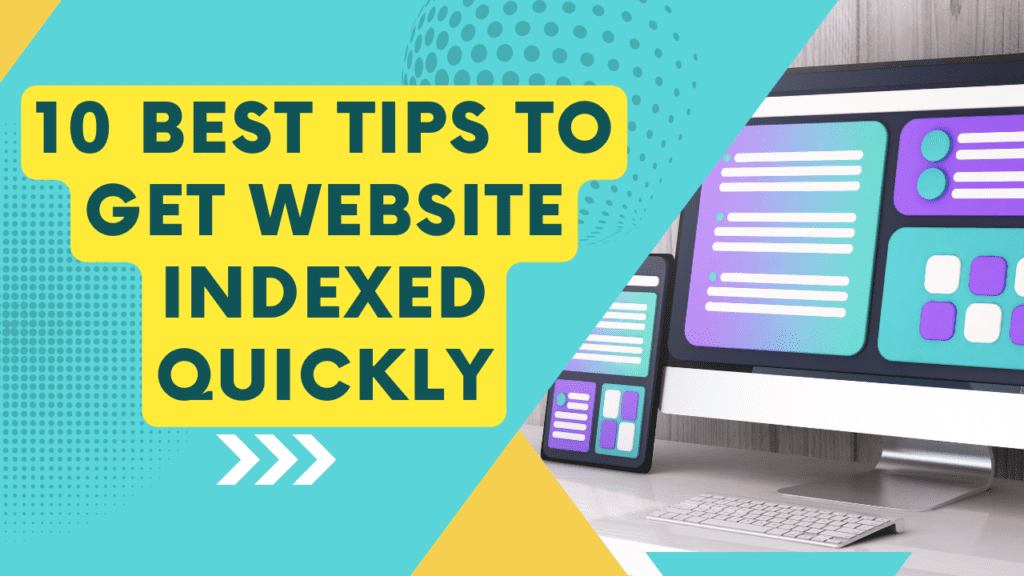10 Best Practical Ways to Get Your Website Indexed Faster
To put it simply, search engines play a huge role in how many people see your website. If your site doesn’t show up on search engines or it takes a long time to do so, your competition can get ahead and capture a bigger audience.

You might be here because you’re having trouble getting Google to notice your new web pages. However, it’s crucial to know how quickly Google can recognize the changes and improvements you make to your website. This is especially important if you have a big website with lots of content that gets updated often.
No matter your situation, the goal is to get Google’s web-crawling tool (called Googlebot) to come to your site, check it out, and put it in its search results as fast as possible. Doing this means you’ll be able to see the results of your marketing efforts sooner and stay ahead of your competitors.
10 Best Practical Easy Ways to Get Your Website Indexed Faster
Today, I’ll be sharing 10 easy tips to help you get your website indexed on search engines quickly. If you’re struggling to get your site crawled and indexed, these tips can make a big difference.
1. Check If Your Website is Crawled:
- To start, you need to determine if search engines are even aware of your website. You can do this by using a simple search query.
- Open a search engine and type “site: your website URL” (replace “your website URL” with your actual web address).
- If your site is being crawled, you should see all of your website’s pages listed in the search results.
- If any pages are missing, it could indicate an issue that needs attention.
2. Use Google Search Console:
- Google Search Console is a powerful tool that allows you to monitor and manage how Google interacts with your website.
- Go to Google Search Console and add your website property if you haven’t already done so.
- Use the URL inspection tool within Google Search Console to check if a specific URL from your site is indexed.
- If your URL isn’t indexed, you can request indexing, but be patient, as it may take up to 24 hours for Google to process your request.
3. Use an Instant Indexing Plugin:
- If your website is built on WordPress, you can expedite the indexing process by using an instant indexing plugin like RankMath.
- Activate the instant indexing feature within the plugin and submit your URL.
- This feature uses an Application Programming Interface (API) to connect directly with Google, potentially making it one of the quickest ways to get indexed.
4. Ensure Your Web Pages Aren’t Orphans:
- Internal linking is crucial for search engine indexing. It helps search engines understand the structure of your website.
- Consider using related post plugins on your website to create internal links between your pages.
- Remember that Google reads HTML, so ensure your pages have internal links coded into them.
You can also read Proven Tips for Boosting Website Traffic
5. Review Your robots.txt File:
- Your website’s robots.txt file is essential for instructing search engine crawlers on which parts of your site to index.
- Access your robots.txt file in your website’s settings, and make sure it’s in its default, unaltered state.
- Any errors or changes to this file can hinder the indexing process.
6. Verify Your Sitemap:
- A sitemap is like a roadmap for search engines, helping them navigate and understand your website’s structure.
- Ensure that your sitemap is present in your robots.txt file.
- In WordPress, you can use plugins like RankMath to view and manage your sitemap.
7. Internal Link to Unindexed Pages:
- If you have specific pages that aren’t getting crawled and indexed, you can help expedite the process by internally linking to them from pages that are already indexed.
- This internal linking strategy assists Google in discovering and indexing the previously overlooked pages faster.
8. Avoid Duplicate Content:
- Duplicate content can harm your website’s search engine ranking. Ensure that each page on your site offers unique and valuable content.
- Avoid reusing the same content with only slight variations, as this can confuse search engines.
9. Noindex Categories, Tags, and Archive Pages:
- To prevent duplicate content issues and optimize your website’s crawl budget, consider setting categories, tags, and archive pages as “noindex” in your SEO plugin (e.g., RankMath).
- This action tells search engines not to index these pages, focusing their attention on your core content.
You can also read YouTube’s Free AI-Powered Thumbnail Generator
10. Remove Low-Quality Content:
- Keep your content fresh, updated, and high-quality.
- Focus on user needs, not just search engines.
- Remove or improve low-quality content that doesn’t add value.
Getting your website indexed quickly by search engines is crucial for increasing your online visibility and staying ahead of the competition. By following these 10 straightforward tips, you can significantly improve your website’s chances of being crawled and indexed promptly. Remember that search engines favor well-structured, high-quality websites, so continually work on improving your site’s content and user experience to maintain and enhance your search engine ranking. With dedication and these strategies, your website will be well on its way to reaching a broader audience and achieving online success.





